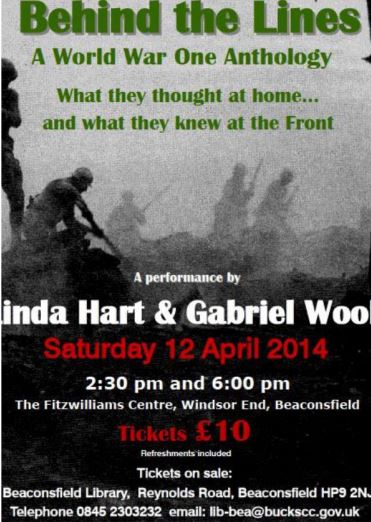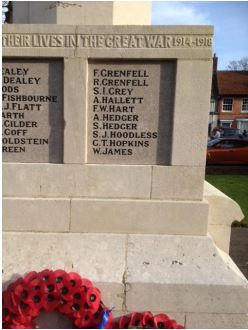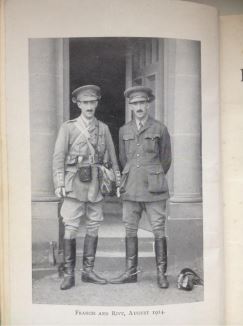
The heroism, horror, suffering and sacrifice of conflict were brought to life at a special literary event on 12th April 2014 in Beaconsfield to mark the Great War centenary. Gabriel Woolf and Linda Hart, making a return visit to Beaconsfield, read a wide variety of poetry, prose and song of those who supported the War and those who hated the War – young and old, men and women, combatants and observers.
'Behind the Lines' told the story of what people thought at home at the start of the War, and what soldiers experienced at the Front, as it went into its second, third and fourth years. The programme included poems by Julian Grenfell, who had family connections with the Grenfells of Wilton Park, Beaconsfield. The enthusiasm for war expressed by Julian Grenfell and Rupert Brooke was contrasted with the bitterness of Siegfried Sassoon and the wry humour of e. e. cummings. Other readings included works by soldier poets Wilfred Owen, Edward Thomas, Ivor Gurney and Isaac Rosenberg.
The readings darkened in tone to reflect the horror that unfolded as the war dragged on. But, says Woolf, "humour helped the soldiers to survive, so our programme included readings from the pages of the famous trench newspaper, The Wipers Times, to provide some laughter. We also included some snatches of WWI songs to lighten the atmosphere, as they did for the soldiers."
Linda Hart notes that "I was pleased to read several works by women who express their joy, their fears and then their anger as time and the war goes on. Most of these women are forgotten because of the focus on iconic poets such as Owen and Sassoon. But no programme on the War is complete without Vera Brittain's diary, and its record of the death of her beloved Roland. As an expat American, I am pleased we included a poem by Robert Frost, who lived in Beaconsfield from 1912 to 1914.”
The Grenfell Connection
There are many connections between the town of Beaconsfield and the Grenfell family. Julian Grenfell was a cousin of Beaconsfield’s war heroes, the Grenfell twins. The twins’ family home was Wilton Park, Beaconsfield. Later they lived at Butlers Court with their uncle and guardian, Field Marshall Baron Francis Grenfell of Kilvey. On 24 August 1914, Capt. Francis Grenfell gained the coveted Victoria Cross for gallantry in action following the Battle of Mons. He was one of the first officers in the British Army to be awarded the VC in this war. His twin brother Riversdale was killed less than a month later. Julian and his brother, Gerald William Grenfell, also died in the War. The twins’ names are on the Beaconsfield war memorial and there is a stained glass window in St. Mary’s Parish Church in their memory.
As an extra to the proceedings, the Rector of St. Mary and All Saints (Rev Dr. Jeremy Brooks), who was in the audience, kindly kept the church open into the evening so that anyone who was interested could look at the Grenfell and all the other war memorials in the church.
Quotes from members of the audience:
“I thoroughly enjoyed 'Behind the Lines'. A sensitive, well-paced production cleverly incorporating diary records and newspaper snippets along with well-chosen poems. Linda Hart and Gabriel Woolf brought the poetry to life, their polished presentation, choice of material encompassing occasional songs and poignant pauses was thought provoking. An evening we won't forget and great introduction to the celebrations/remembrance of the First World War. A hard act to follow. Well done and thank you.”
“We really experienced the horrors and hopes as well as the futility and the comradeship, from the heartfelt words of the time. The compilation carefully put together by Linda Hart and Gabriel Woolf interwove the views of participants, families, reporters, writers and even humorists, all presented and delivered with their enthralling professionalism. We found that the words from back home were just as moving as those from the front. We all know of the Great War but we cannot know it; tonight, though, we really felt it.”
Mike Elliott, Chairman of the Beaconsfield Society, said:
“Thankfully, most of us can only imagine what war is like. This thought-provoking assembly of readings and verse gave insight into the adventure, patriotism, heroism, horror, suffering and sacrifice of the Great War.”
Kari Dorme, committee member and organiser, commented:
“We had great audiences for both performances who enjoyed and experienced all the contrasts and mixtures of emotions of the poetry, letters and songs. There was enthusiasm for war, there was bitterness and horror expressed, there was humour and some laughter too. People appreciated and followed the comprehensive printed program that listed all readings; many would go home and reread their favourite WW1 poems”.
Beaconsfield WW1 Centenary Commemoration Day (organised by the Beaconsfield WW1 Centenary Working Group)
Following the literary event, on Sunday 3rd August 2014 a parade of Scouts, Air and Army cadets left from the Rugby Club in Windsor End to arrive just before noon for a wreath laying ceremony at the War Memorial, led by Rt Hon Dominic Grieve MP and by the Mayor Steve Jones. This was followed by an equally fully-attended service in St Mary and All Saints church. As part of the act of remembrance, the names of all 80 people on the war memorial were read out and candles lit.
It is hard for us to appreciate the consequence of the appalling loss of life suffered on all sides during the First World War. Almost every town and village in Britain was bereaved. Husbands, sons, and brothers, all volunteers, paid the ultimate sacrifice for their patriotism. They were faced with the horrors of the trenches, mown down by machine gun fire and poisoned by gas. Some have no known graves, some died at home of their wounds but most are buried in foreign soil. There are 80 names of the fallen on the Beaconsfield war memorial including three sets of brothers killed.
The Grenfell twins, Francis and Riversdale, have a stained glass memorial window in St. Mary’s church. Captain Francis Grenfell was one of the first officers to gain the coveted Victoria Cross in WW1 on the 24th August 1914. Other war memorials in the church are dedicated to Captain Sir Edward Hulse and Lieutenant William Lawson, nephews of Viscount Burnham of Hall Barn. Both were killed in their twenties in Flanders.
To discover more about the names on the Beaconsfield war memorial, go to the Buckinghamshire Remembers website www.buckinghamshireremembers.org.uk. This is an excellent research tool; for every name you can discover their rank, full name, age when killed, parents’ names and addresses. Many were born and lived in Beaconsfield; it is poignant indeed to read road names that we know today – Aylesbury End, Shepherd’s Lane, Baring Road, Curzon Avenue, Hedgerley Lane, Lakes Lane and Candlemas Lane.


(photo of the twins from a book by John Buchan titled Francis and Riversdale Grenfell published Thomas Nelson 1920 ed.)
